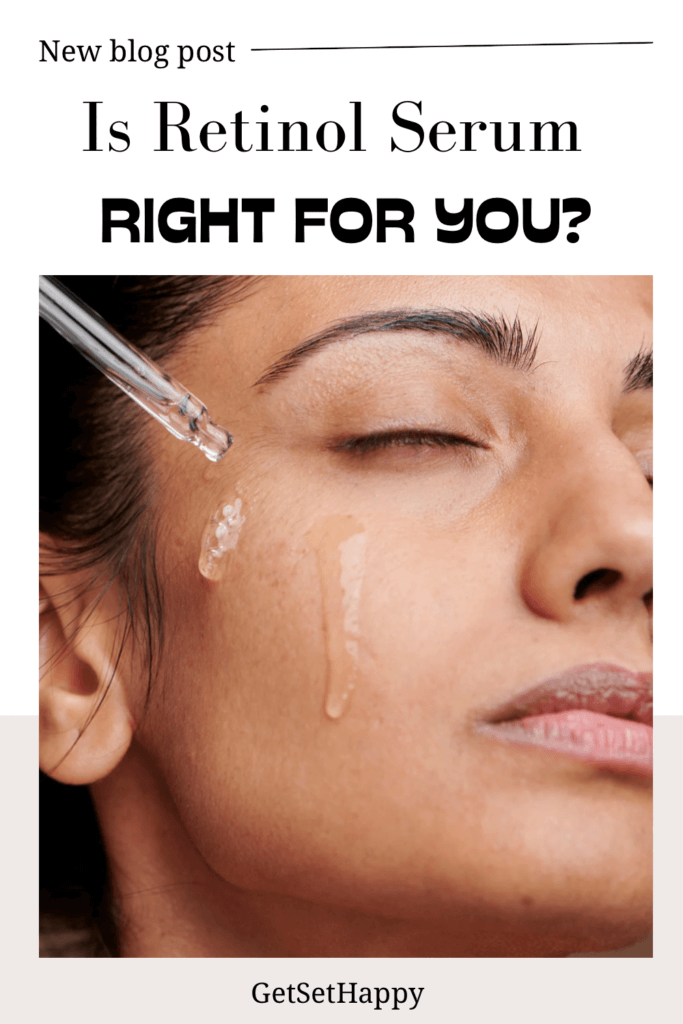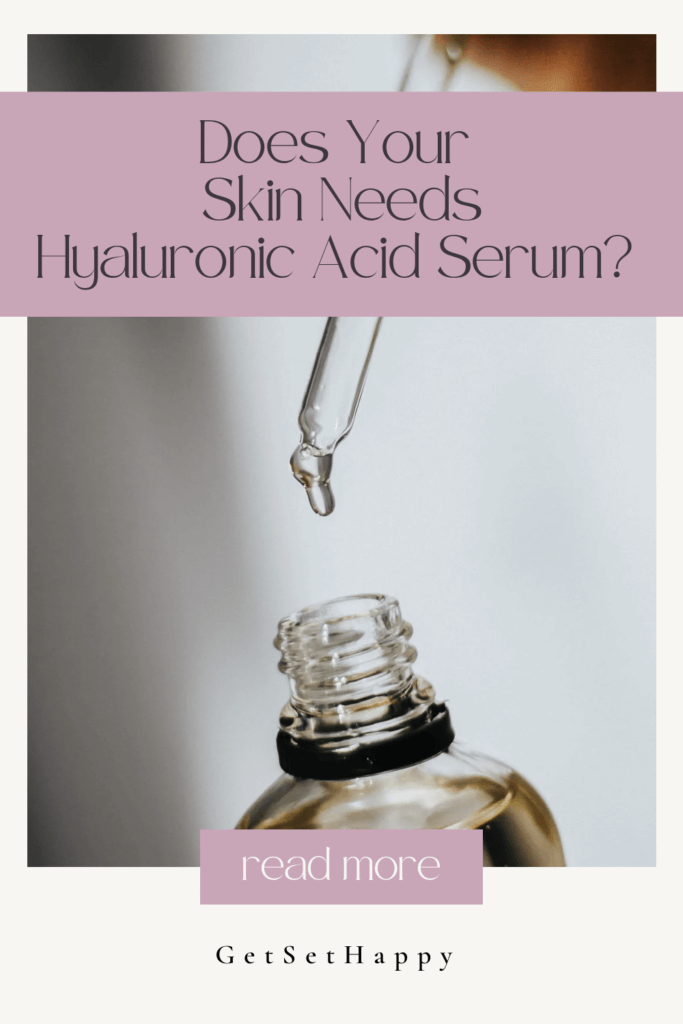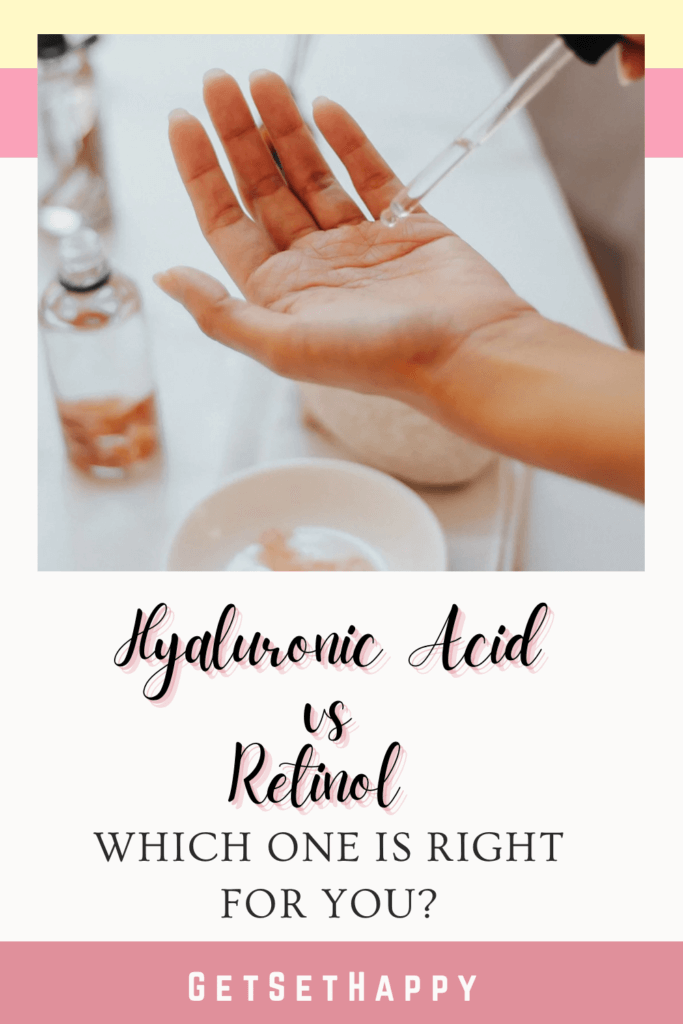Hi Gorgeous! Starting from today, I am starting a new series of posts in which I’ll discuss the anti-aging solutions. This would include home remedies for skin aging, Best anti-aging serums and creams, night serums for wrinkles. Top brands offering these products and much more. Stay tuned for lots of resources to keep your skin healthy and youthful for years to come.
If anti-aging skincare is what you are looking for, then probably you have already explored both Retinol Serum as well as Hyaluronic acid Serums from the top brands. But what exactly is the difference between the two and which one is the right for your skin needs? Let’s Explore!
What is Retinol?

Retinol (in the form of serum and creams) is a good skincare ingredient that has been used for centuries in skin care due to its benefits for skin health. It is an oil-soluble form of vitamin A that can help reduce wrinkle formation as well as regulate collagen production, prevent acne, and improve texture. But what is retinol? It is a form of vitamin A that can help improve your skin’s appearance. Retinol works to whiten your skin making more of the natural pigment in this area visible. Many people are hesitant to use it due to the negative effects it can cause on the skin in the long run. However, if you utilize this skincare ingredient correctly, you can see amazing results with no side effects.
What is Hyaluronic Acid?

Hyaluronic acid (HA) is a natural sugar that occurs naturally in the skin and can help with cell hydration, renewal, elasticity, and wound healing. HA actually repairs the skin where it has been damaged by make-up, pollution, or other effects of aging. However, it does not grow new cells so will not correct the damage that has occurred much more than a few months ago. HA works to restore the skin’s natural barrier to prevent new damage from occurring. Unlike many other ingredients that help the skin, HA does not harm the skin or cause dryness or sensitivity. Instead, it will help keep your skin healthy and bounce back from any damage you may experience.
What is Hyaluronic Acid Collagen Type I & IV?
Hyaluronic Acid Collagen Type I & IV works to improve your skin’s moisture level, elasticity, and firmness.
Retinol vs Hyaluronic Acid
Hyaluronic acid and retinol are two different things. Hyaluronic is hydrating, while retinol increases the skin’s cell turnover.
Research shows that retinol may increase the levels of all three types of hyaluronic acids found in your skin. It can also increase your dermis’s production. However, it takes quite a long time to do so.
Hyaluronic acid, on the other hand, mimics your skin’s NMFs. It acts as a humectant and draws water from your epidermis to your dermis. Without microchannels or injections (HA fillers), hyaluronic acids will not penetrate the dermis.

Hyaluronic acid = rapid skin hydration in the epidermis
Retinol = Slow but sustained skin hydration for your dermis.
Good news: You don’t need to choose between retinol and hyaluronic acids. They work well together.
The research found that creams containing retinol (and hyaluronic) improved wrinkles, age spots, and overall skin radiance. This was after eight weeks of use. The cream’s effects lasted for four weeks after it was discontinued.
There are other benefits to using retinol and hyaluronic acids together:
- Retinol irritation can be reduced by hyaluronic acids.
- Retinol can increase skin cell turnover. While it may speed up the production and transport of new skin cells to your skin’s surface, it does not exfoliate your skin.
- The enzymes that dissolve the bonds between skin cells can function properly if your skin is well-hydrated. Hyaluronic acid, in other words, can increase your skin’s natural exfoliation process.
Both long-term and short-term hydration – While retinol works to increase your skin’s natural production, a serum containing hyaluronic acids can provide instant, temporary hydration.
How to Use Hyaluronic Acid Vs Retinol
It is best to use hyaluronic acid twice daily, while retinol should be used only once per day. Whereas, Retinol is perfect for night skincare regimen. This is because it may get activated by sunlight (but you can still apply sunscreen over retinol).
To reduce irritation, it is best to use retinol slowly. You can use it once for the first week and twice for the second. People with sensitive skin might not be able to tolerate daily retinol use. Research suggests that retinol can still be effective when used only 1-3 times per week.
Hyaluronic acid is not a harsh ingredient. It won’t irritate the skin if you start slowly. Hyaluronic acid should always be used in conjunction with a heavier moisturizer, or occlusive to keep the water from escaping from your skin’s surface.
Because it’s easier to penetrate damp skin with skincare ingredients than dry, hyaluronic acid works best on damp skin. The hyaluronic acid can draw out surface water of your skin (which means for maximum hydration, apply moisturizers to dampen skin.)
On the other hand, it’s good to apply retinol serum to dry skin, so as to avoid irritation on the skin.
This could mean that the order in which retinol serum and hyaluronic acid serum are applied may look something like this:
- Cleanse
- Use a hydrating cream/toner or leave the skin damp.
- Use a moisturizer or serum containing hyaluronic acids.
- Give it time to dry. Gel moisturizers and serums dry quicker than heavier moisturizers.
- Use retinol cream/moisturizer
- Follow retinol with a heavier moisturizer, preferably one that contains ceramides and cholesterol. This will help reduce skin irritation and strengthen your skin’s barrier.
Wrapping Up – Hyaluronic Acid vs. Retinol
Hyaluronic acid and retinol are different because they work differently on your skin. Hyaluronic acid moisturizes your skin, while retinol boosts the rate at which your skin makes new cells. On the other hand, Hyaluronic acid serum exfoliates your skin, while retinol can boost your skin’s natural production.
You can use both retinol and hyaluronic acids if you are unsure. Both can enhance each other’s effectiveness and hyaluronic acids can reduce irritation often associated with retinol.
Stay Tuned Beautiful Ladies! I am coming up soon with
Top 10 Brands offering Hyaluronic Acid for Youthful Skin
AND
10 Best Retinol Serums for Aging Skin
Featured Image: Selfcare photo created by freepik – www.freepik.com





15 Comments
Flawless World
July 11, 2022 at 7:25 pmAwesome post! Hyaluronic acid is definitely the unsung hero of skincare, and retinol is a phenomenal product to use at night in conjunction with HA. Thanks for sharing!
sammi swinton
July 12, 2022 at 3:30 amI have to use both! Especially in the summer – They are both great for the skin
Ranjeeta Nath Ghai
August 5, 2022 at 10:06 pmI think I will have to use both Hyaluronic acid and retinol because of ageing and also because I have now started having acne breakouts post COVID. Never had a pimple on my face and now I got to deal with acne at 52!
Alpana Deo
August 6, 2022 at 1:58 amHonestly, I haven’t used any of these two. But have heard people using. Atlas now I have information if I plan to add it to my skin care routine.
Samata
August 6, 2022 at 12:57 pmU actually explained me a big thing today as I was getting so many serums to review these days some saying retinol and some hyaluronic acid.. I was confused in differentiating the same. Thanks for explaining so well
Samata
August 6, 2022 at 12:58 pmU actually explained me a big thing today as I was getting so many serums to review these days some saying retinol and some hyaluronic acid.. I was confused in differentiating the same. Thanks for explaining so well. Well penned content
Amy
August 7, 2022 at 11:53 amWonderful explanation and helpful for those who barely knows about the skincare products. Being oily skin girl, I skip hyaluronic acid. But retinols serum are my best friends causing no allergic reactions
Sandy N Vyjay
August 8, 2022 at 10:19 amVery informative post that demystifies Hyaluronic acid and retinol. I like the fact that you have complete details and clearly demonstrated the use of both, and their effectiveness.
Yogeeta Yeram
August 8, 2022 at 10:34 pmReading this was fun as both of these are my fav ingredients for skin! Hyaluronic acid just gives your skin a big gulp of water and Retinol of godddd its soo good just cannot emphasize enough!
Kriti
August 9, 2022 at 11:13 amI use both they are great for the skin
Thank you for sharing this it’s very useful
Energetic reads
August 9, 2022 at 9:39 pmI have heard alot about retinol and hyaluronic acid serums. Also, there are so many brands offering these two. Thank you for helping us to understand the difference and significance. This will help alot in picking the right product.
Sweety Joshi
August 10, 2022 at 9:51 amGreat explanation. I am kinda confused with this. I really want to start such serums but hesitated. You have cleared the things. Thank you.
Sarita Panda
August 10, 2022 at 10:51 amAs I have extremely dry skin hyaluronic acid is like blessing for dry skin people and yes retinol in pm skincare is best and both are amazing and beneficial for skin. Loved the detailed pointers
Manisha Garg
August 10, 2022 at 8:04 pmChoosing between retinol and hyaluronic acid has been a dilemma for many. Your post really helps to understand how they both work and what is best for you, thanks.
Jeannine
August 11, 2022 at 2:07 pmThis two items are the most heard of nowadays when it comes to skin care. It’s great that you’ve identified what this is really made of and the good benefits its really giving to our skin. Sometimes people really just follow trends without knowing what they are really getting into. Appreciate you writing about this topic. Very helpful.